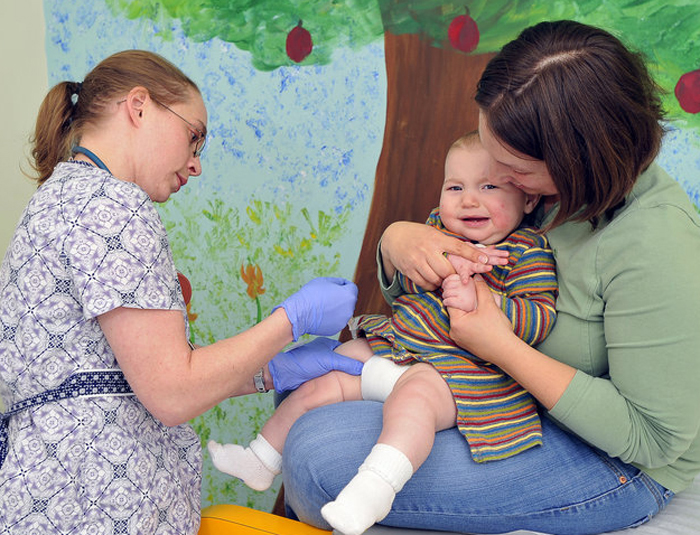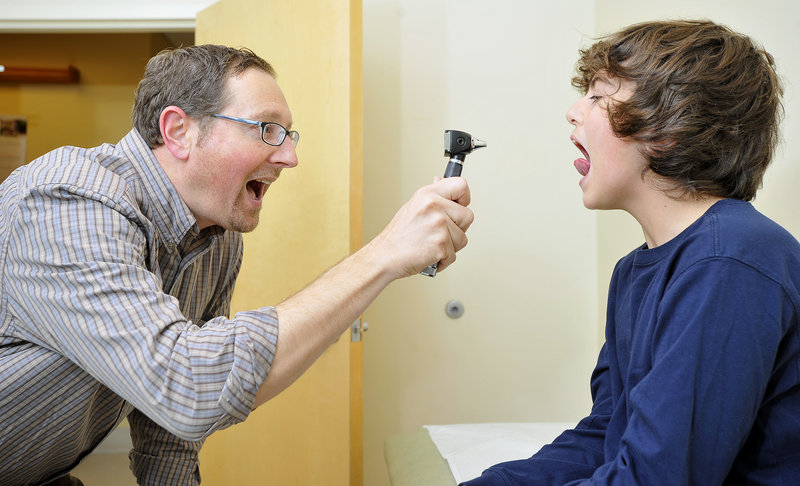Fewer Maine children are getting their recommended vaccinations today than five years ago, and the state’s medical community is trying to reverse that trend.
Maine’s declining immunization rate follows a national trend and is putting children and others at risk of diseases such as whooping cough and measles that were brought under control decades ago, according to doctors and public health officials.
Maine had 163 diagnosed cases of whooping cough, or pertussis, between Jan. 1 and Nov. 10 this year, compared to 53 for all of last year. The fact that a percentage of Maine children are not immunized is contributing to the resurgence, said Dr. Sheila Pinette, director of the Maine Center for Disease Control.
“The most effective way to treat it is vaccination,” she said.
Meanwhile, measles outbreaks have occurred in Massachusetts and Canada, said Pinette. “It’s surrounding us,” she said.
While travelers have brought the illness into Maine, it has not spread here in recent years.
The majority of Maine parents continue to get their children immunized as recommended against a growing list of diseases, from polio to mumps. But Maine’s immunization rates have declined since peaking in 2005, federal records show.
Immunization rates vary depending on which vaccines are included. The percentage of Maine children who received one core group of vaccines has dropped from about 75 percent in 2005 to 70 percent in 2010.
At the same time, the percentage of kids who entered kindergarten with a parental waiver from vaccinations increased from about 3 percent to about 3.6 percent. Maine’s is one of the highest vaccination exemption rates in the East, although it remains much lower than the rates seen in some Western states.
Maine parents enrolling a child in kindergarten are asked to show that the pupil has been vaccinated for diphtheria, tetanus, pertussis, measles, mumps, rubella, polio and chickenpox. However, parents can sign a form exempting their child and must simply say whether the exemption is for medical or philosophical or religious reasons.
Schools keep track of exemptions in part because unvaccinated students must stay home for 10 days if a school experiences a chickenpox outbreak.
While other parts of the country also have experienced gradual decreases in the immunization rate, Maine has gone from having a higher-than-average immunization rate to being right at, or just below, the national average, the statistics show.
There are several reasons for the trend.
Access is a significant problem in a large rural state such as Maine, according to Dr. Christopher Pezzullo, a Portland pediatrician and assistant professor of pediatrics at the University of New England College of Osteopathic Medicine. Some parents have a hard time getting to regular appointments with a pediatrician.
Pezzullo and Cassandra Grantham, program manager of child health and immunizations at MaineHealth, were recently awarded a $12,000 grant to develop a strategy to bring vaccines to Maine children in less traditional settings.
“Can we make schools and day care centers part of the access for immunizations?” Pezzullo said. “Why can’t our whole community bear some of the responsibility for the health of our children?”
Pezzullo and Grantham plan to complete their study in six months, and then use their plan to expand access.
Cost also can be a barrier for parents. Public health experts hope Maine’s immunization rate will get a boost in January, when the state launches a universal childhood immunization program.
The Maine Vaccine Board, with funding from insurers, will purchase and distribute vaccines to all medical providers for all patients, regardless of whether the patients have public insurance, private insurance or no insurance. The program was approved by the Legislature last year.
Efforts to make immunization more accessible or affordable won’t necessarily overcome one other obstacle to expanded immunization, however — distrust of the vaccines and the public health agencies that recommend them.
Parents who skip vaccines say they’ve made the decision because there are simply too many shots, or they fear that the vaccines could be linked to autism, or they believe the shots could cause illness rather than prevent it, according to a 2008 survey by the University of Southern Maine’s Muskie School of Public Service.
Phil St. Onge of Winslow said he and his wife declined many of the immunizations recommended for their 6-year-old son after hearing about possible links to autism and other side effects.
When his son was born, “we looked at all of the shots they want(ed) to give this little (baby) … and it didn’t make sense,” he said. They decided the risk of the shots outweighed the risk of getting some of the diseases.
St. Onge said the medical community earns money from the vaccinations and is concerned more about population health than the health of individuals such as his son.
His son has been healthy, and he is partly protected because enough of the population is immunized to prevent the diseases from spreading uncontrolled, St. Onge said.
“The question parents have is: Is the cure worse than the disease?” said Ginger Taylor of Brunswick.
Taylor has a son with autism and strongly believes there is a link between immunizations and the growing number of autism cases, as well as other health problems.
She maintains a blog and website with information about the issue and testified earlier this year in favor of legislation to make vaccinations optional in Maine, even in health emergencies. The bill failed, but resistance is growing as parents go on the Internet and learn about vaccine dangers, she said.
“Something fundamentally has changed about the public’s understanding of vaccination,” Taylor said.
Until the public health community honestly addresses the concerns of those parents, efforts to increase immunization rates will fail, she said.
Public health experts, meanwhile, say the possibility of links between autism and childhood vaccines has been thoroughly studied — and dismissed — by researchers.
“There’s a lot of misinformation out there,” said Deborah Deatrick, vice president of community health for the MaineHealth network of hospitals and medical practices. “The vast majority of parents understand that this is certainly the best thing they can do to protect their children from diseases.”
People who don’t trust the vaccines make up a small minority, of parents, but doctors have a difficult time overcoming doubts raised on the Internet, said Pezzullo.
“We’re trying to give (parents) really good, unbiased information, and we are competing against inflammatory pseudoscience,” he said.
Pezzullo also said he does not force the vaccination issue if parents decide to slow down or modify the vaccination schedule.
“They have the freedom to decide,” Pezzullo said. “I want to have the child be as safe as possible within the values of the family.”
Some in the medical field worry that Maine’s declining immunization rate — whatever the reason for it — is putting children and others at greater risk of diseases such as whooping cough.
The pertussis vaccine wears off over time and does not provide 100 percent protection. But, if enough families decline childhood vaccinations, the population loses its “herd immunity,” making it easier for such diseases to spread again, they said.
Those most at risk when whooping cough spreads through a community include young babies who have not yet been vaccinated and the elderly, whose vaccinations have worn off, health officials said.
“I’m actually very nervous to have my daughter around other children who are not vaccinated,” said Grantham, the program manager of child health and immunizations at MaineHealth. “There were 10 kids who died last year in California because of pertussis.”
Grantham said she hopes to use another anticipated grant to help doctors educate their patients about the real risks and benefits of vaccines.
Christine Kelly, a mother of two from Cumberland, made sure her 7-month-old son, Nathaniel, got all his shots, although she and her husband did delay a hepatitis B vaccine for a couple of years after asking the pediatrician about the risks.
Now, Kelly said, she doesn’t have to worry so much when diseases such as whooping cough spread through communities in Maine.
“I researched it a lot and talked to my pediatrician and made what I thought was the best decision for my family,” she said.
Staff Writer John Richardson can be contacted at 791-6324 or at:
jrichardson@pressherald.com
Send questions/comments to the editors.




Success. Please wait for the page to reload. If the page does not reload within 5 seconds, please refresh the page.
Enter your email and password to access comments.
Hi, to comment on stories you must . This profile is in addition to your subscription and website login.
Already have a commenting profile? .
Invalid username/password.
Please check your email to confirm and complete your registration.
Only subscribers are eligible to post comments. Please subscribe or login first for digital access. Here’s why.
Use the form below to reset your password. When you've submitted your account email, we will send an email with a reset code.